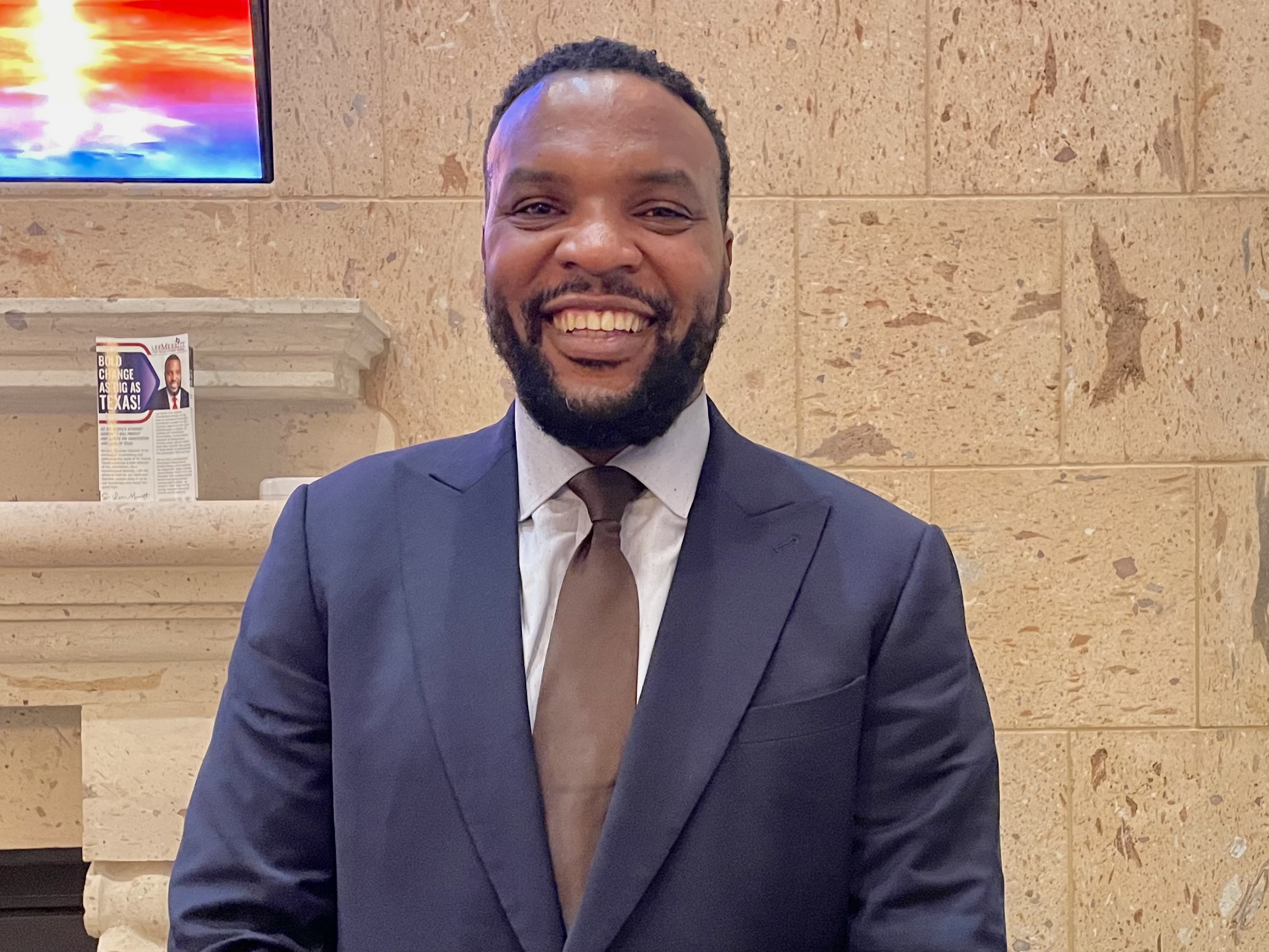Texas is slowly approaching its primary elections, and one name in Texans ballots this year will be Lee Merritt.
Lee Merritt is one of Texas’ Democratic candidates for Attorney General.
Merritt is an advocate for issues that affect Texans, such as fighting for the right to vote in highly gerrymandered areas, protecting public education, protecting women’s reproductive rights, creating accountability for the power grid, and confronting the mental health crisis, among many more.
On February 16, Merritt held a fundraising meet and greet event where citizens were welcome to join him to learn more about his campaign and ask him one-on-one questions.
Q: Your issue on the mental health crisis is less ‘policing’ and more mental health solutions. How will you make this happen if chosen as the new Attorney General?
A: That’s really going to be one of the cornerstones of my administration is starting a mental health department within the Attorney General’s Office. There are no mental health departments in the state of Texas. Other states are getting that right, but I have said Governor Greg Abbott has declared a mental health emergency in the state of Texas but hasn’t offered any resources or any policies or anything to accompany it.
My mental health department will be working with county judges to get the mental health resources into the counties to administer best practices. I live in Collin County, and so the case I was working on with a young man named Marvin Scott III is when I decided to run. He suffered a mental health crisis and was found with a joint, so instead of being taken to a mental health facility, he went to a jail where his condition deteriorated. They didn’t have any soft rooms, which were more or less padded, and they didn’t have the proper equipment. So instead, eight officers held him down till he suffocated and died. It was that case when I decided that I would run for AG.
I began work with Collin County with the commissioner’s court to identify resources they could have. First, we started working with law enforcement agencies in the region. There are probably about a dozen police departments in that region, Plano, Allen, McKinney, etc. Each city has its own municipality, some of which have sight and release. So, if they found Marvin with a joint, they would have just stomped it out. In areas like Alan PD, you could be arrested for a small amount of marijuana. There should have been some coding. In other words, Marvin had previously been institutionalized. So he had a mental health record, but they didn’t have a system in place that would have identified him as someone who needed mental health care—using cases like that, to identify best practices and then using AG’s office to support those resources.
“Instead of law enforcement,” the truth is it would be law enforcement adjacent. I don’t necessarily believe in right-alone programs. I think each municipality can choose what’s best for them. Law enforcement, their suicide rates are up among law enforcement officers as a high-stress job, and they don’t have the resources they need. Instead, they’re being forced to respond to the mental health crisis themselves, like mental health resources into law enforcement, and then relieving some of the pressure from them so they can get back to policing and that the mental health community could actually respond to that crisis.
Q: You are also focused on Economic Empowerment to strengthen our communities, but with the crime in Texas on the rise, namely in Houston, what are your plans to help combat this problem that the citizens feel safe?
A: Crime is a symptom of poverty. To deal with crime in our urban areas, you have to deal with the plight and the lack of resources. And we have already begun to do that.
Not only the Joe Biden Build Back Better program, because those funds haven’t been released yet. Currently, the Community Reinvestment Act, CRA, has set aside funds to deal with plight issues and issues of concentrations of poverty.
Instead, they’re compounding the problem. It is designed so that individuals can become homeowners and entrepreneurs can start small businesses and reinvestment programs for those communities. It started when the CRA was first passed; they started pouring money into those communities until they decided that it should go into affordable housing, but not at the concentrations of poverty. Banks that don’t necessarily qualify for those funds are receiving them and creating low-income housing; those funds should be distributed to homeowners, entrepreneurs, and community empowerment programs.
The claim right now is that not enough people are applying for those programs to receive the funds, and those who are applying don’t have enough qualifications. The banks are qualified; they don’t reach the standard where they get the money anyway. The truth is if there was more notice and a better Liaison Group between the Attorney General’s Office, particularly the regulations department in the community, people would access that money. You can’t convince me that people in the inner city don’t want those funds, and groups in the inner city don’t want those funds to purchase homes or build businesses.
I was at the attorney general conference a few months ago. It showed that once you have people employed in well-fed communities that are clean and safe, they showed a market increase between community gardens, well-lit areas, nice-looking communities, etc., and crime goes down. Automatically, it’s a bigger deterrent to beat cops on the street or more gun control. So, that’s the strategy.
Q: For first-time voters or young voters who don’t really know the role of an attorney general, in simple terms, what is the role of the attorney general?
A: The role of the Attorney General is the people’s law firm. Most people don’t have a private attorney, but every citizen in Texas has the right to access the largest firm in the country as their personal attorney. Right now, for a long time, my firm has been called “the people firm.” So if there’s an issue and someone feels their civil rights have been violated, they call my office. It’s been an honor, but the truth is that office is supposed to be the AG’s office. So if anyone wants a better idea of what the AG’s office should be doing, they can have a look at my office to how it runs, but on a micro-level.
On a macro level, it’s a $1.26 billion budget, 3000 employees, 750 attorneys, 350 offices all over the country that are specifically designed to serve the needs of the people, when their rights are violated, when they want access to resources, when they have issues as consumers. That’s the role and responsibilities.
For more information on Lee Merritt, readers and visit www.leemerritt4texas.com.
Registered Texan voters can vote in the Texas primaries on March 1.
Photo Credit: Katia Castrejon






